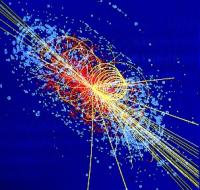
Collider phenomenology is now one of the most important research programs in particle physics because the CERN Large Hadron Collider (LHC) experiment has been running since autumn 2009. In fact, the LHC experiment has been providing many precious data on the studies of the standard model (SM) and physics beyond the SM, and those are being used to test various models of particle physics. The members of Kavli IPMU collider phenomenology group have therefore great opportunities in exploring these physics, and pursue a broad range of research.
The LHC experiment enables us to systematically investigate the electroweak symmetry breaking, to study quantum chromodynamics (QCD), and to probe new physics beyond the SM. Among several researches of collider phenomenology, the most of the members in the group are studying physics beyond the SM such as
- Supersymmetry,
- Extra-dimensions,
- Composite Higgs (Little Higgs, etc.),
- Dark matter,
- Other unexpected exotics.
The LHC experiments have observed the higgs boson with a mass of 125 GeV, while no new physics signals are discovered yet. These results are (and will be) used to have a deep understanding of physics beyond the SM at the TeV energy-scale.
It is also worth emphasizing that the study of the collider phenomenology at the Kavli IPMU has several advantages, because the study is directly and indirectly influenced by other research programs. Connections between the study of collider phenomenology and those of model buildings of particle physics, dark matter searches, and cosmology are particularly of importance. As already mentioned in this report of other research-programs, Kavli IPMU has many active researchers working on these topics. It is thus possible for the members of the group to efficiently perform their studies.
In addition to collider phenomenology at the LHC experiment, some of the members are also studying those at other collider experiments which are planned in near future. They are especially interested in the studies of physics beyond the SM at High Luminosity-LHC (HL-LHC) experiment and future lepton collider experiments such as the International Linear Collider (ILC) and Compact Linear Collider (CLIC). (Last update: 2018/04/26)






